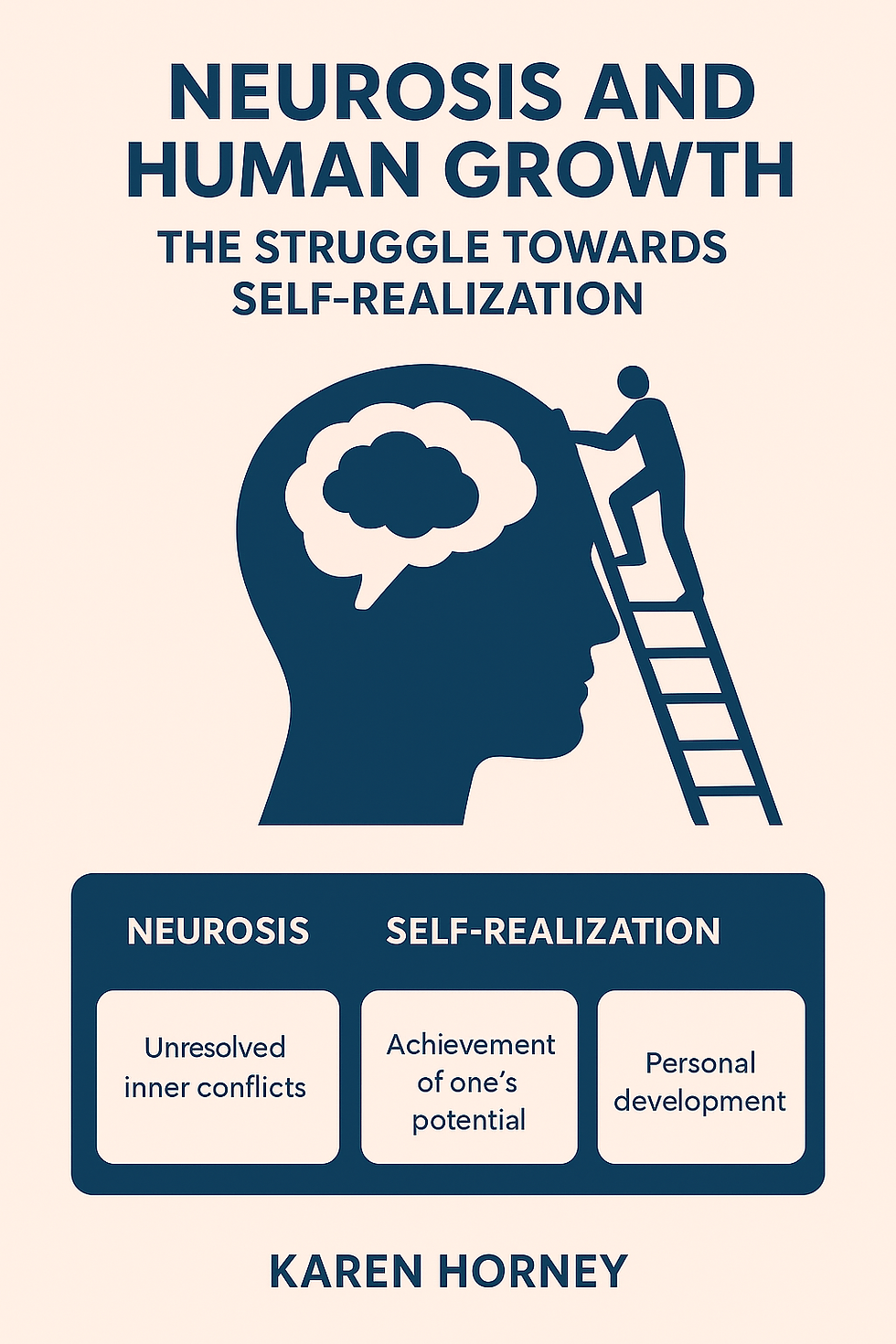Neurosis (Neurosis and human growth the struggle towards self realization (karen horney)
- Musleh Saadi

- Sep 1
- 5 min read
Neurosis is an inability to adapt and a tendency to experience excessive negative or obsessive thoughts and behaviors. The term has been in use since the 1700s. In 1980, the diagnosis was removed from the "Diagnostic and Statistical Manual of Mental Disorders." While no longer a formal diagnosis, the term is still often used informally to describe behaviors related to stress and anxiety.1
Karen Horney (pronounced HORN-eye) was a psychoanalyst and theorist who suggested that people possess several neurotic needs that play a role in driving behavior. In her 1942 book "Self-Analysis," Horney outlined her theory of neurosis, describing different types of neurotic behavior as a result of overusing coping strategies to deal with basic anxiety.
This article discusses Horney's theory of neurotic needs, including those for power, prestige, and affection. It also covers the three broad categories of needs and how they contributed to Karen Horney's theory of personality.
Horney's Theory of Neurotic Needs
Psychoanalytic theorist Karen Horney is known for developing one of the best-known theories of neurosis. She believed that neurosis resulted from basic anxiety caused by interpersonal relationships.
Horney's theory proposed that strategies used to cope with anxiety can be overused, causing them to take on the appearance of needs.
According to Horney, basic anxiety (and therefore neurosis) could result from a variety of situations. She suggested that as children, people often have experiences that contribute to neuroticism, including:
Excessive admiration
Injustice and discrimination
Isolation from other children
Lack of respect for needs
Lack of guidance
Lack of warmth
Over-protection
Parental arguments or hostility in the home
Too much or too little responsibility
Unkept promises
Three Types of Neurotic Needs
Horney's neurotic needs can be classified into three broad categories:
Needs that move people toward others: These neurotic needs cause individuals to seek affirmation and acceptance from others. People with these needs are often described as needy or clingy as they seek out approval and love.
Needs that move people away from others: These neurotic needs create hostility and antisocial behavior. These individuals are often described as cold, indifferent, and aloof.
Needs that move people against others: These neurotic needs result in hostility and a need to control other people. These individuals are often described as difficult, domineering, and unkind.
Neurotic people tend to use two or more of these ways of coping, which then creates conflict, turmoil, and confusion.
Karen Horney's Theory of Personality
The three broad categories of neurotic needs essentially describe the various ways that people can cope with their social experiences. Horney believed that these coping strategies could affect a person's personality and came up with three types of personalities:2
Aggressive: Assumes that everyone is the enemy and only looks out for themselves
Compliant: Sensitive to the needs of others and spontaneously works to meet others' expectations
Detached: Seeks to become self-sufficient, creating emotional distance from others to the point of alienation
Horney's theory is rooted in social psychology and contends that personality is affected by the way people perceive and interact with their environment.2

Horney's 10 Neurotic Needs
Well-adjusted individuals use all three coping strategies (toward, away, and against others), shifting focus depending on internal and external factors. So what is it that makes these coping strategies neurotic? According to Horney, it is the overuse of one or more of these interpersonal styles.
1. The Need for Affection and Approval
Horney labeled the first need as the neurotic need for affection and approval. This need includes the desire to be liked, to please other people, and to meet the expectations of others. People with this type of need are extremely sensitive to rejection and criticism and fear the anger or hostility of others.
2. The Need for a Partner
The second need is known as the neurotic need for a partner who will take over one's life. This involves the need to be centered on a partner. People with this need have an extreme fear of being abandoned by their partner. Oftentimes, these individuals place an exaggerated importance on love and believe that having a partner will resolve all of life’s troubles.
3. The Need to Restrict One’s Life
The third need centers on the neurotic need to restrict one's life within narrow borders. Individuals with this need prefer to remain inconspicuous and unnoticed. They are undemanding and content with little. They avoid wishing for material things, often making their own needs secondary and undervaluing their talents and abilities.
4. The Need for Power
Horney described the fourth need as a neurotic need for power. Individuals with this need seek power for its own sake. They usually praise strength, despise weakness, and will exploit or dominate other people. These people fear personal limitations, helplessness, and uncontrollable situations.
5. The Need to Exploit Others
People with a neurotic need to exploit others and view others in terms of what can be gained through association with them. People with this need generally pride themselves on their ability to exploit other people and are often focused on manipulating others to obtain desired objectives, including such things as ideas, power, money, or sex.
6. The Need for Prestige
Individuals with a need for prestige value themselves in terms of public recognition and acclaim. Material possessions, personality characteristics, professional accomplishments, and loved ones are evaluated based on prestige value. These individuals often fear public embarrassment and loss of social status.
7. The Need for Personal Admiration
Individuals with a neurotic need for personal admiration are narcissistic and have an exaggerated self-perception. They want to be admired based on this imagined self-view, not upon how they really are.
8. The Need for Personal Achievement
According to Horney, people push themselves to achieve greater and greater things as a result of basic insecurity. These individuals fear failure and feel a constant need to accomplish more than other people and to top even their own earlier successes.
9. The Need for Independence
This need is described as a neurotic need for self-sufficiency and independence. These individuals exhibit a “loner” mentality, distancing themselves from others in order to avoid being tied down or dependent on other people.
10. The Need for Perfection
People with a neurotic need for perfection and unassailability strive for complete infallibility. A common feature of this neurotic need is searching for personal flaws in order to quickly change or cover up these perceived imperfections.
Recap
The neurotic needs described by Horney include the need for affection, partnership, structure, power, control, prestige, admiration, achievement, independence, and perfection.
How Neurotic Needs Affect Behavior
Neurotic needs can lead to different types of behavior depending on the individual, their needs, and the situation. For example:
Sometimes neurotic needs can lead to behavior that is aggressive or antisocial. People with neurotic needs for power, prestige, or achievement may engage in behaviors that can be aggressive or exploitative.
At other times, neurotic needs may cause people to withdraw. Those with a need for independence, for example, might turn away from others as a way to feel more self-sufficient.
In other cases, neurotic needs cause people to behave in ways that are compliant. For example, people who crave approval or affection may engage in people-pleasing behaviors to ensure that others like them.
Research suggests that people who are high in neuroticism tend to be more prone to negative emotions. This can contribute to a higher risk for feelings of anxiety, self-consciousness, anger, irritability, depression, and emotional instability.3
Neuroticism has been associated with physical health issues, including lower immunity, heart problems, and an increased risk of death.4 It is also linked to lower marital satisfaction, increased worry, work-related problems, and overall lower quality of life.5
manager_journals,+1+241+UCP-JLL+Format



Informative article 👍
Awesome 👍